Graham Reid | | 13 min read
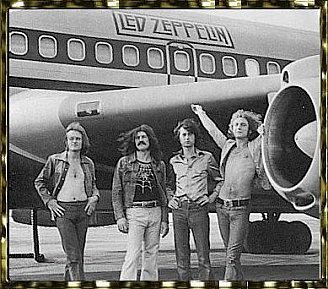
They might have been the biggest band in the world at the time, but they were openly despised, ignored or condemned by critics. Even later, after the shouting had died and a clearer perspective was possible, Dave Marsh, one of America's most venerated rock writers, couldn't resist another attack.
He damned one of their classic songs as "the most vulgar record in [rock history]" and "a ragged, nasty projection of male hormonal anguish".
Yeah. And?
It was Whole Lotta Love, and what he criticised was actually the point of the song. It was rock for hormonal boys, a yelp of white adolescent blues dressed in crotch-hugging denim and delivered in stadium-shaking volume. It was a defining moment for its audience and for the band, which rode across the planet howling it out: Led Zeppelin.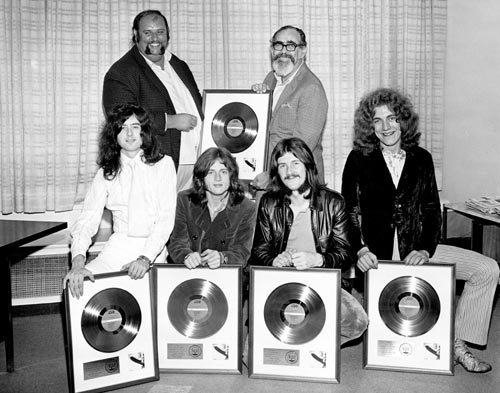
It has been more than 20 years since Led Zeppelin wound up after the death of their drummer John Bonham, who, in the manner of a great rock death, choked on his vomit.
Unlike others, they chose not to find a replacement but let the legacy lie. They had towered over the 80s anyway, filled stadiums and fields, made classic albums, given rock radio half a dozen songs they'd be the poorer without -- notably Stairway to Heaven and that song Marsh so hates -- and even made a concert movie, the shonky and unflattering The Song Remains the Same.
For singer Robert Plant, guitarist Jimmy Page and bassist/keyboard player John Paul Jones there was little left to accomplish after Bonzo was found dead in Page's house after knocking back at least 20 shots of vodka.
And so Led Zeppelin slipped into the past, but never went away. Even now their songs thump out of classic hits stations and low menacing cars with mag wheels. Their place in rock history is assured, yet they still smart about those critical barbs they received.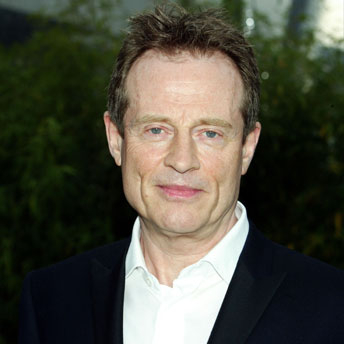
"We were completely ignored by the British press," says the quietly spoken, 57-year-old Jones as he sits in a record comany office in New York. "And we got a pasting by the American press before we'd even set foot in America. We were being lambasted for being 'inauthentic'.
"What is authentic about rock'n'roll, for Chrissake? Oh, and we were 'hyped'. I couldn't imagine a less-hyped band than Led Zeppelin when we went to America, it was just four musicians who gave great live show. That was it. No press, nothing.
"There were a couple of Atlantic Records press releases and that was our lot. But we were doing great shows. I remember the first Rolling Stone review and it was awful. It wasn't only that he didn't like the music, he didn't like us.
"We were reading it and thinking, 'Do they mean us? Is it some other band they're talking about?' The sheer spite bewildered us, and then we got very defensive about the press."
For years Led Zeppelin adopted a stand-off with the media. Plant and Page particularly would be scathing and aloof, and even now are wary.
Not so Jones who, despite being in a band notorious for its excesses, seems to have come out the other end much as he went in: he is still married, still has the rounded vowels of his Kent upbringing, and has a healthy perspective on what the band was all about. That's useful because Led Zeppelin are about to make a comeback.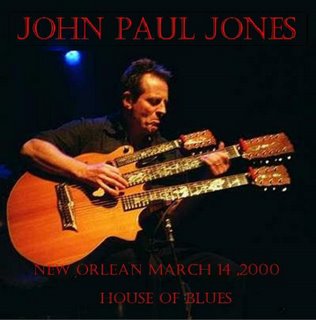
No, not a reformation -- and there will be no questions along those lines, warns an American record company woman -- but a slew of Led Zeppelin material like never before.
However, their career has hardly been decaying. The original albums were given CD treatment and later rereleased in remastered versions, then the 1990 four-CD box set for which Page remastered and reconfigured the material. In '97 came the BBC Sessions double live disc, and two years ago Early Days and Latter Days collected some of their finest tracks. Led Zep have hardly been out of sight.
But, in fact, they have. What has been missing -- aside from the The Song Remains the Same film -- has been footage of the band in their heyday. And maybe decent live material capturing them in their natural environment. 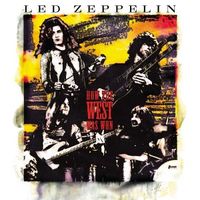
Now, thanks again to Page ruthlessly ensuring the band's status and bank balances through state-of-the-art representation, this gap has been closed. So forget about buying new mag wheels, guys, because here comes the thumping three-CD live set How the West Was Won, pulled from shows in Los Angeles and Long Beach, and a five-hour double DVD set which includes live footage from the Royal Albert Hall in 1970, Madison Square Garden, Earls Court and their return to a British stage after a four-year absence at Knebworth.
On the DVDs are also bits and pieces: black-and-white footage of them playing a field in Sydney, some American press conference stuff and some rare footage from a television show.
The DVD set is, as Jones says, for people who weren't there to experience Led Zeppelin. And -- despite those stories of groupie notoriety, Page dabbling in black magic, Bonzo's boozing -- it was about music.
"This is a chance for people who've heard the name and the reputation to now find out what the fuss is all about. I saw the DVD on the big screen for the first time a week ago in London and it's like being at a gig, you've got the 5.1 surroundsound which I think is ideal for live material anyway because it puts the ambience of the room behind you.
"People were cheering at the ends of songs like a real gig. Even I cheered at the end of [Bonham's showpiece] Moby Dick. More than The Song Remains The Same, people get a real feeling of the power and everything Led Zeppelin was about."
Led Zeppelin formed out of the ashes of 60s pop-rockers the Yardbirds -- they briefly played as the New Yardbirds -- when guitarist Page linked up with session musician Jones. Page brought in Plant, who insisted his mate Bonham come along too, and the four of them set up in a rehearsal room in '68.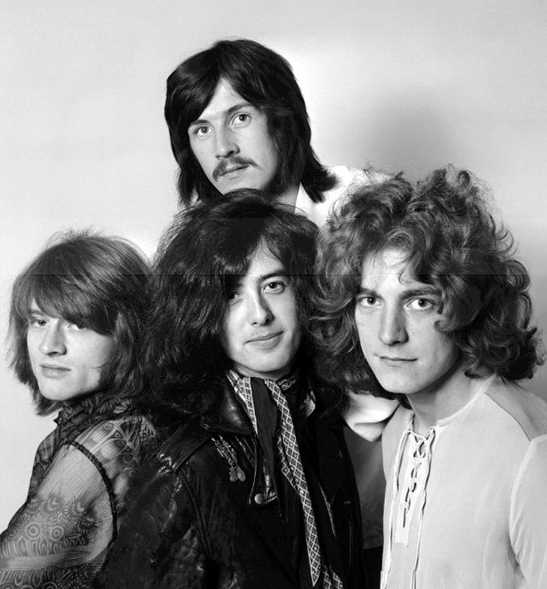
"I knew we had something from the very first song we ever played which was Train Keep A Rollin'. It was the first time I met Bonzo, we all plugged in and said, 'What do you know?' Page mentioned this number they'd done with the Yardbirds and the whole place just exploded.
"I knew immediately this was definitely a bunch of guys worth sticking with. It was a joy after endless days in the studio as a session musician. It was my wife who made me call Jimmy and ask if they needed a bass player. I booked them all on a PJ Proby session I was doing to get them a bit of cash."
But for classically trained, multi-instrumentalist Jones -- whose lucrative session credits for arranging and playing included the Rolling Stones, Donovan, Jeff Beck and numerous Yardbirds' songs -- it was time to take the risk and play live again.
Who drummer Keith Moon gave them their name when he predicted they'd go down like a lead zeppelin, they recorded their self-titled debut album in two days -- blues and folksy covers heavied up -- and, with Peter Grant as their ruthless manager, took off for America to blaze their own trail despite a disdainful music press.
"We started in America at the birth of FM underground radio. Basically we used to turn up at radio stations. You'd find a shack in the desert with an antenna sticking up and that was it. They'd literally just play the album and back-announce it. So everyone heard us in America through radio and word of mouth, as they did later in England and Europe. The press didn't have much to do with it."
The rest, as they say about Led Zep, is hysteria.
They found their audience among suburban kids who couldn't see the revolutionary movements of the late 60s doing much for them and just wanted to rock. Led Zep did that -- and Robert "Percy" Plant did it in skin-tight jeans singing old blues lines like "Squeeze my lemon till the juice runs down my leg".
If the phrase had been around at the time, Led Zep were politically incorrect and, at the height of the anti-war movement and feminism, they were scrupulously apolitical. They were also phenomenally successful, had their own plane, sold records by the multimillions, and extended their songwriting into Anglo-folk and North African styles (the seminal Kashmir).
But what the DVD interviews show is the context in which they worked, with the rock media unsophisticated and out of touch. There is a telling sequence where Page and Plant in '70 are repeatedly asked about the Beatles' influence on them.
"Maybe they saw the band as a bit of a phenomenon," says Jones with forgiving thoughtfulness. "We were beginning to get quite a big following and the only other band we were comparable to, for them, was something like the Beatles -- which wasn't true because they were a household name and had television and films.
"We didn't do any of that. The question, 'Will you be making a film?' took me by surprise because we were just a band that made music, it wasn't that type of operation. We had a big following but it wasn't a 'popular' band like the Rolling Stones. We didn't appear in the tabloid press."
Which is just as well, given what they were getting up to in hotel rooms and aboard their private jet. They defined rock'n'roll excess for subsequent generations of musicians.
When Plant's son Karac died in '77, however, it looked like the band was finished. Plant retired to the country for a year. Eventually they went back into the studio -- for the less than satisfactory In Through the Out Door -- and made a triumphant return to live performances with two shows at Knebworth in August '79, their first in Britain for four years.
"It was a kind of beginning although we know in hindsight it was the end [because of Bonham's death the following year]. But we'd been through a low point with Robert's son dying, and everybody was questioning what we were doing and why we were doing it. So it was kind of toe in the water again - in front of quarter of a million people, all right. But that's how we did things in those days. 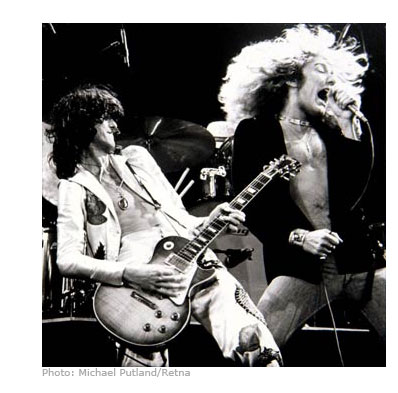
"We weren't sure how it was going to pan out and you can see it in the footage. We did what we always did, heads down and concentrate, listen and look and just get into the music. And after a couple of numbers you can see everybody relaxing as things were obviously going well. We all still had it, and were tight enough.
"I never listen to bootlegs unless I come across them by accident so I hadn't really heard anything of Knebworth. All I remember was people would say Robert wasn't very happy.
"But when I saw it again, I thought it was great and Robert was smiling and it was a pleasant surprise. I'd begun to think maybe it hadn't been good.
"I can remember not liking Earls Court because it had the sound of Paddington Station. But watching the beginning of Stairway and remembering how lush that song had become, it was like a big warm bath, that intro. That's when I thought it was really worth seeing."
Jones says unearthing the footage has been a major project for Page ("He seems to know where all the stuff is, I don't think he's telling"). Most of it was in unmarked boxes, other pieces were bought from bootleggers' collections. Then there was the polishing up of the sound. The three remaining members had veto on the final product but also enjoyed reviewing it.
For each of them, however, with separate careers -- Jones a sought-after producer who has worked with REM, the Butthole Surfers, Diamanda Galas and speaks highly of the "brilliant" Datsuns whom he saw last week -- this has been a diversion into something they are proud of but which doesn't smother them.
"Zeppelin was my life, but not any more," says Jones.
"One of the main things I noticed listening back, however, was how tight we were. I knew we were good, but I didn't quite realise how good.
"From the audience point of view it's great to see the interaction on stage and the big thing I noticed, especially when viewing from the audience, was how everything was driven from the drums. Whenever there was a point of improvisation or a change of gear or mood, everybody was like 'See you at the drums in 20 bars' and we'd all meet right in front of the bass drum and work stuff out and then move off again."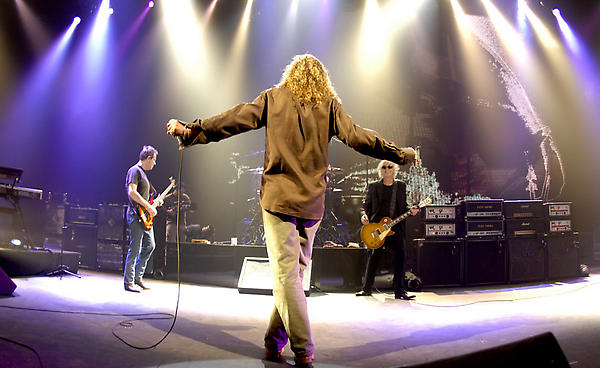
Looked at from this time of stadium shows with sidescreens and video projections, a Led Zeppelin concert was stripped to the bone. Often little by way of lights, strobes or dry ice.
"We didn't bother with the other stuff, we would just get on with the music which was the most interesting thing about Zeppelin. The band was never boring on stage. People say, 'Oh, you have to play Whole Lotta Love every night, that must be boring'. No, you just make it interesting. Every night you come at it fresh."
And almost 25 years after Led Zeppelin last played together, through the conjunction of digital technology, archival footage and ear-abusing sound, they look and sound remarkably fresh again.
"You know," says Jones, as if surprising himself, "this music is timeless. A lot of it could have been recorded yesterday."

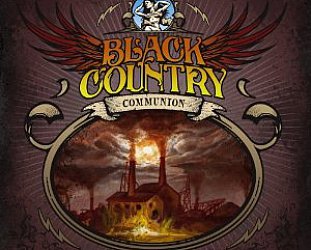
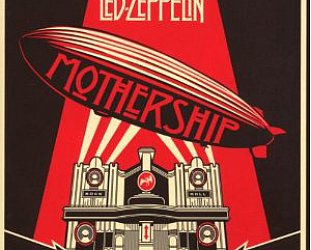
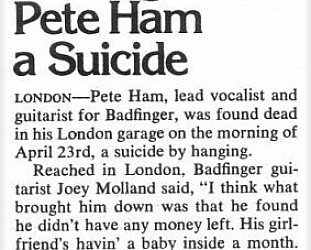
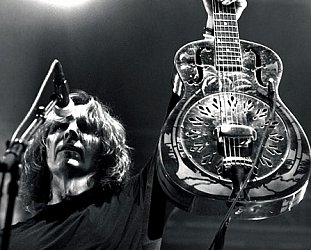
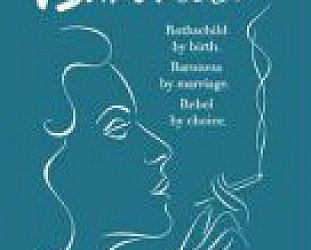
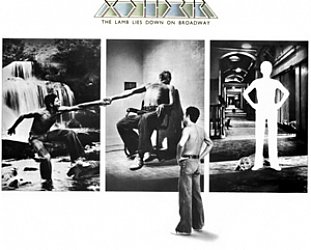
post a comment